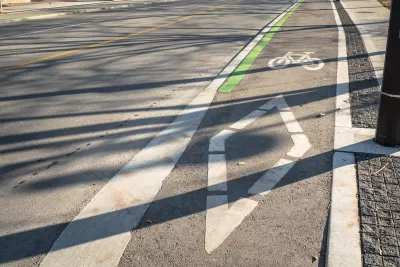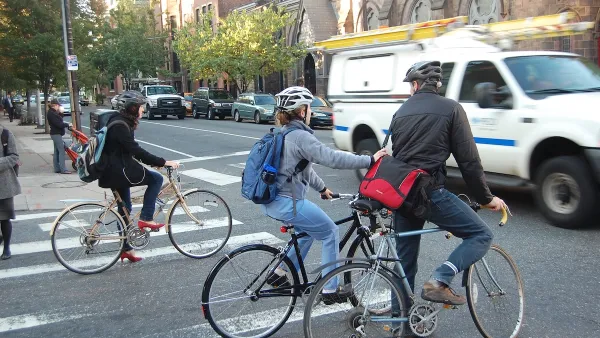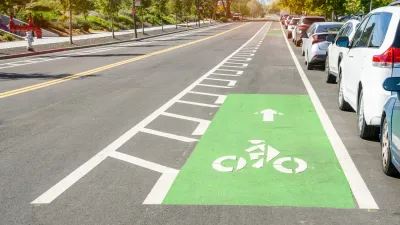Some cities are going so far as to rip out protected bike infrastructure that took years of advocacy to build.

“The trend to remove bike lanes is growing, and it is scary, and based in an imaginary world where the only thing that exists is a car and its suburban driver,” writes Ron Johnson in Momentum, drawing attention to a troubling trend that is seeing city officials in U.S. and Canadian cities removing hard-won bike infrastructure.
At the federal level in the United States, President Trump has expressed disdain for bike lanes and a desire to kill New York City’s congestion program (along with its bike infrastructure). But the trend began before his election, with cities like Ontario and San Mateo moving to destroy existing bike infrastructure.
It’s one thing to remove a painted bike lane, which offered little protection anyway. But, to invest the resources to actually remove safe and separated bike lanes that take planning, and millions of dollars of investment, is so non-sensical it’s always comedic if it weren’t so tragic.
For Johnson, part of the problem stems from the lack of long-term vision and commitment to cycling infrastructure. “A real bike network isn’t just a few painted lines or token bike boulevards. It’s a commitment to creating a connected, protected network that spans an entire city—one that allows cyclists to get from point A to point B without dodging traffic, worrying about unsafe intersections, or feeling like an afterthought in a car-dominated city.”
People who want to see bike infrastructure continue to grow must, in Johnson’s view, advocate loudly for it against the tide of opposition. “It won’t be easy, but it’s crucial that we continue to push for safe, accessible, and well-connected bike networks in our cities.”
FULL STORY: Cities Start to Backpedal on Bike Lanes: A Growing Crisis for Cyclists

Maui's Vacation Rental Debate Turns Ugly
Verbal attacks, misinformation campaigns and fistfights plague a high-stakes debate to convert thousands of vacation rentals into long-term housing.

Planetizen Federal Action Tracker
A weekly monitor of how Trump’s orders and actions are impacting planners and planning in America.

In Urban Planning, AI Prompting Could be the New Design Thinking
Creativity has long been key to great urban design. What if we see AI as our new creative partner?

King County Supportive Housing Program Offers Hope for Unhoused Residents
The county is taking a ‘Housing First’ approach that prioritizes getting people into housing, then offering wraparound supportive services.

Researchers Use AI to Get Clearer Picture of US Housing
Analysts are using artificial intelligence to supercharge their research by allowing them to comb through data faster. Though these AI tools can be error prone, they save time and housing researchers are optimistic about the future.

Making Shared Micromobility More Inclusive
Cities and shared mobility system operators can do more to include people with disabilities in planning and operations, per a new report.
Urban Design for Planners 1: Software Tools
This six-course series explores essential urban design concepts using open source software and equips planners with the tools they need to participate fully in the urban design process.
Planning for Universal Design
Learn the tools for implementing Universal Design in planning regulations.
planning NEXT
Appalachian Highlands Housing Partners
Mpact (founded as Rail~Volution)
City of Camden Redevelopment Agency
City of Astoria
City of Portland
City of Laramie





























